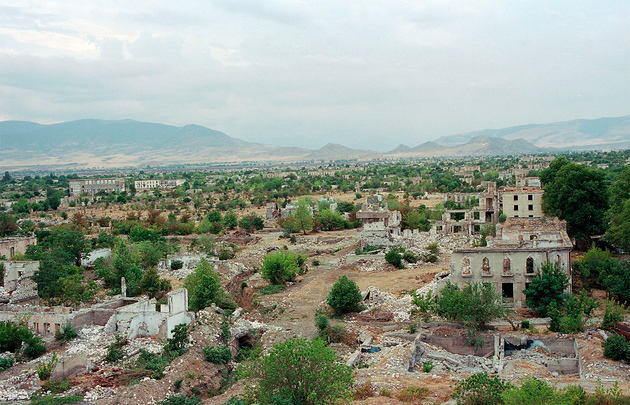The Nagorno-Karabakh conflict has become a part of history of the South Caucasus. For three decades it had been fuelled by the Armenian leadership's ultranationalist ideology and part of the Armenian diaspora, proclaiming the superiority of Armenians over all their neighbors and falsifying the history of the region. During this period the occupants of Karabakh damaged historical and religious monuments on 20% of the territory of Azerbaijan, devastated cities and villages, desecrated and destroyed many mosques, armenized Christian churches, ruined monuments and landmarks.
It was only possible to put an end to this vandalism of Armenian nationalism, when foreign cultural objects are either named "Armenian", or liquidated, or (at best) left to the mercy of fate, thanks to the Second Karabakh War, when the occupation army was defeated by the Azerbaijani liberation troops and the leadership of Armenia was forced to sign the documents of surrender. Only thanks to the victory of its rightful owners over the invaders, this land found a way to revive the historical memory, before the invaders, poisoned by ultra-nationalist ideology, expelled the local population and turned the flourishing land into a desert.
However, Armenian nationalism did not give up. The Armenian army lost thousands of people and many military equipment worth hundreds of billions of dollars, over 10 thousand invaders deserted, but the ideologists of the ultra-nationalist doctrine scattered around the world did not suffer any losses. Although the end of the Karabakh war opened the way for the normalization in the South Caucasus, the restoration of human relations between Armenians and Azerbaijanis and the reintegration of both Karabakh into Azerbaijani society and Armenia into regional processes, nationalists both in Yerevan and in the diaspora preferred to continue the route of escalation of interethnic and interreligious problems to the road to peace.
A typical example of their activities is today's international "web symposium" of supporters of the Karabakh occupation, organized by Armenian organizations in Europe and the Echmiadzin Monastery. The event is attended by representatives of the diaspora from the EU countries, as well as historians, lawyers and priests of these countries, who for any reason sympathize with the views of Armenian nationalists. Formally, the theme of the "web symposium" is "The Christian historical and cultural heritage of the peoples of the Armenian highlands and adjacent territories", but in reality the speakers will focus on attempts to interpret the historical facts about the South Caucasus and Christianity in this region as the distortion of the history of the Armenian people by Azerbaijan. The very title, which uses the toponym "Armenian highlands" invented by Armenian falsifiers, warns that the participants will convince each other and listeners of the reality of their false theories, created with only one purpose - exalting Armenians over their neighbors at any cost.
These people will not mention the cities destroyed by Armenian nationalists, such as Aghdam, Jabrayil, Zangilan, Fizuli, or hundreds of Azerbaijani villages razed to the ground, as well as thousands of historical, cultural and religious Azerbaijani monuments, turned into ruins and dust for the sake of all the same goal of the supporters of the Karabakh occupation all over the world. While Azerbaijan proposes to turn away from hatred and start moving towards the prospect of peaceful coexistence, nationalists in Armenia and in the diaspora are trying to voice their lies more and more loudly. Of course, they do this both to cover up the crimes of the occupiers and to prevent the stabilization of Armenian-Azerbaijani relations, but their main task is to preserve the very doctrine of Armenian superiority, under which they can continue to get paid.
At the same time, they are not really worried that maintaining nationalism in Armenia poses a daily threat of the emergence of new hotbeds and an obstacle to safety in the South Caucasus, because they do not live in post-war Armenia, torn by crises, but in countries where their security and well-being is guaranteed. They are also indifferent to the fate of the region's monuments, although today they will suggest the opposite: if the preservation of historical memory is really important to them, instead of organizing such events aimed solely at inciting interethnic and sectarian hatred, they would turn to Azerbaijan with specific restoration projects to restore the objects destroyed during the occupation.
Unfortunately, we have to admit that after the end of the Karabakh war, the information war of facts and fakes, truth and fabricated lies about the history of the South Caucasus has only intensified. The supporters of the Karabakh occupation, who lost the war, are trying to "win in the past", dress criminals as victims, and victims as criminals: do everything so that Armenian nationalism will survive and continue to produce profits. This means that the battle for peace, justice and truth is not over yet.






